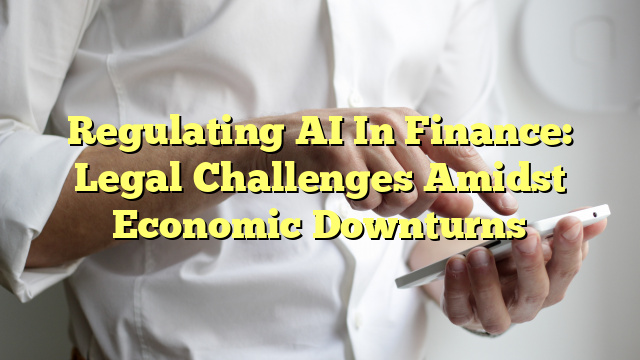Table of Contents
Challenges in Regulating Artificial Intelligence
Regulating artificial intelligence (AI) in the financial sector poses several legal challenges, especially during economic downturns. One of the main challenges is the rapid pace of technological advancements, making it difficult for regulators to keep up with the evolving AI systems. Additionally, the complexity of AI algorithms and their decision-making processes makes it challenging to understand and assess their potential risks and implications.
Another challenge is the lack of standardized regulations and frameworks specific to AI in finance. The existing regulatory frameworks were primarily designed for traditional financial systems and may not adequately address the unique characteristics and risks associated with AI technologies. This regulatory gap creates uncertainty and inconsistency in the application of AI in the financial sector.
Furthermore, the global nature of AI and the financial markets adds another layer of complexity to regulation. Coordinating and harmonizing regulations across different jurisdictions is a significant challenge, as each country may have its own approach to regulating AI in finance.
AI in Financial Regulation
AI is increasingly being used in financial regulation to enhance efficiency, accuracy, and compliance. AI algorithms can analyze vast amounts of data and identify patterns and anomalies that may indicate potential risks or regulatory violations. This helps regulators in monitoring and detecting fraudulent activities, market manipulation, and other illegal practices.
AI-powered systems can also automate compliance processes, reducing the burden on financial institutions and improving the speed and accuracy of regulatory reporting. Machine learning algorithms can continuously learn and adapt to changing regulatory requirements, ensuring compliance in real-time.
However, the use of AI in financial regulation also raises concerns. The opacity of AI algorithms and the lack of interpretability can make it difficult to understand how decisions are made. This can lead to issues of accountability and fairness, as individuals may be subject to automated decisions without a clear understanding of the underlying reasoning.
Negative Impact of AI in Finance
While AI has the potential to revolutionize the financial sector, it also comes with certain negative impacts. One of the main concerns is the risk of algorithmic bias. AI algorithms are trained on historical data, which may contain biases and discriminatory patterns. If these biases are not addressed, AI systems can perpetuate and amplify existing inequalities and discrimination in financial decision-making.
Another negative impact is the potential for systemic risks. The interconnectedness of financial markets and the reliance on AI systems can create vulnerabilities in the system. A failure or malfunction in an AI algorithm can have widespread consequences, leading to market disruptions and financial instability.
Additionally, the increasing reliance on AI in finance can lead to job displacement and economic inequality. As AI systems automate tasks previously performed by humans, there is a risk of job losses, particularly in low-skilled roles. This can exacerbate income inequality and create social and economic challenges.
Problems AI Can Solve in Finance
Despite the challenges and negative impacts, AI also has the potential to solve various problems in finance. AI algorithms can improve fraud detection and prevention, reducing financial losses for individuals and institutions. They can also enhance risk management by analyzing complex data and identifying potential risks in real-time.
AI-powered chatbots and virtual assistants can improve customer service and streamline processes, providing personalized recommendations and support. This can lead to better customer experiences and increased customer satisfaction.
Furthermore, AI can contribute to more efficient and accurate investment decision-making. Machine learning algorithms can analyze market trends, historical data, and other relevant factors to identify investment opportunities and optimize portfolios.


As financial regulation for AI is increasingly critical during economic downturns, it is essential to consider the legal challenges that arise.